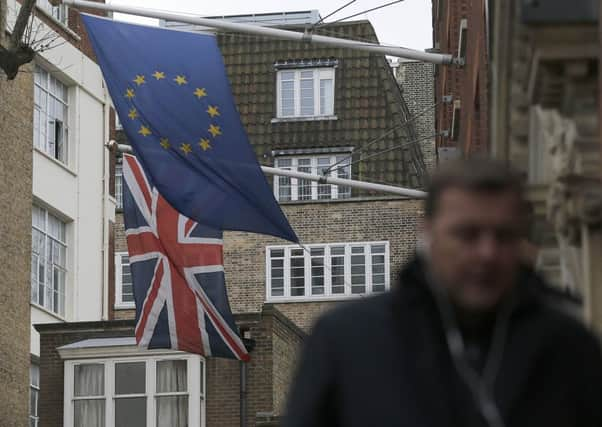Andrew Wilson: Walking away from EU is not the answer


He appears to have told his staff they were “overpaid for doing nothing” and in return is being pursued for racism. The former mayor of Barcelona may indeed be guilty of that, I cannot know. But he also has a remarkably distinguished career in city development, not least in his wonderful hometown.
The programme he now leads was set up four decades ago to promote urban development and adequate shelter. After all this time its impact on the sprawling slums of urban Africa and elsewhere is unclear to me.
Advertisement
Hide AdAdvertisement
Hide AdMy instinct is that it is probably unclear to Clos as well. The world’s slum-dwelling population is knocking on for one billion souls. Ponder that statistic and the unspeakable human misery it represents, every day.
Ban Ki-moon, the UN Secretary-General, would do well to deal quickly with any racism allegations anywhere, false or real. But he should also be aware that the all-seeing eye of public scrutiny will be visited on the United Nations soon, and it ought to be.
It appears from the reports that some of the UN’s own leaders regard their work in many places as completely pointless. Staff are paid as much as 800 times the national average salary in some locations where they work.
They don’t pay any income tax. Why is that even allowed? Why isn’t that questioned or scrutinised? They live in free housing in often lush compounds with sports and leisure to rival most resorts. They don’t even appear to pay tax on the alcohol they can buy in their own duty-free off-licence. The sons and daughters of their executives are educated in the finest private schools in the world. And their impact on the countries they are meant to improve? Questionable very often.
No doubt other colleagues are brought in to assess their assessments in substantial reports that hold them to account for the good work they write. These are then filed somewhere important no doubt.
But “overpaid for doing nothing” is the view of Clos of his own team. I am bound to ask what his own responsibility for that is? This is one storm in one city in one corner of Africa. It may be brushed under the UN’s carpets or it may open up a hornet’s nest. It ought to.
The era of scrutiny and reform shows no sign of abating. Closer to home the risk of Brexit from another major international institution – the European Union – is real and present. That it has come to this is another sign of our times.
The post-war institutions we have relied on at home and internationally have lost touch with their missions and the people they exist to serve. On a grand scale.
Advertisement
Hide AdAdvertisement
Hide AdFrom banks to politicians, the BBC to Fifa, everywhere we look transparency is exposing the awful standards that the leadership of our world have presided over. That this is now being reformed is a good thing.
The scandals have not led us to eliminate the institutions we rely on but to begin, we hope, to change them fundamentally and to refocus them on their core purpose. It is an era of cleansing and we will emerge a better society for it.
The UN is clearly flawed. Monumentally so. And it is remarkable that we spend such little time debating and scrutinising it. But if it didn’t exist something like it would need to be invented.
Its leaders and funders would do well to learn the lessons of recent history and open themselves up now to fixing problems like the Clos scandal in Kenya.
The same must be true of the EU. Its purpose has drifted way off course from the mission most of us want for it. Its remoteness from the realities of the daily life we all lead makes it easy prey for populist politicians and commentators. But to walk away from it rather than reform it would leave the world a poorer place.
The Prime Minister’s campaign to lead the country to remain in is being sabotaged by some of his best and oldest friends who are coming out for exit. Meanwhile the positive case is barely being heard. In turn he is deploying a playbook that is close to the one he used in the Scottish referendum. Fear, uncertainty and doubt from the very leaders of institutions that the population are cynical about.
“But we won,” he might argue justifiably. Maybe, but there was a swing of 8 per cent to Yes. The swing required to take Britain out of Europe was less than 3 per cent and it looks, at best, balanced now.
I don’t know if there is time left to make a renewed and positive case for why the benefits of the EU outweigh the costs. But we must try. And we must remind ourselves that the best way to reform the institutions we rely on is from the bottom up and from the inside. «